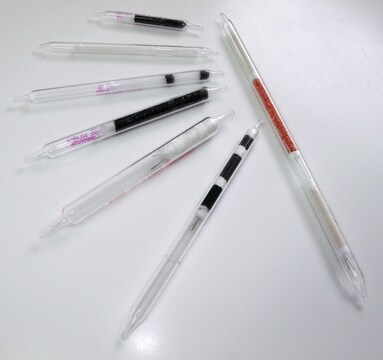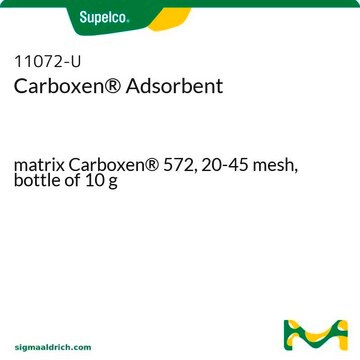추천 제품
product name
Carbosieve Adsorbent, matrix Carbosieve S-II, 60-80 mesh, bottle of 10 g
제품 라인
Carbosieve
Quality Level
형태
granular
포장
bottle of 10 g
기술
LPLC: suitable
gas chromatography (GC): suitable
solid phase extraction (SPE): suitable
표면적
~1059 m2/g
기질
Carbosieve S-II
기질 활성군
carbon
입자 크기
60-80 mesh
공극 크기
~0.01 cm3/g mesoporosity
~0.45 cm3/g microporosity
~0 cm3/g macroporosity
~6-15 Å pore diameter
density
~0.61 g/mL (free fall density)
분리 기술
reversed phase
유사한 제품을 찾으십니까? 방문 제품 비교 안내
일반 설명
A carbon molecular sieve (CMS) is the porous carbon skeletal framework that remains after pyrolysis of a polymeric precursor. These particles are:
Generally, CMS adsorbents offer greater relative adsorptive strength compared to spherical graphitized polymer carbon (SGPC) and graphitized carbon black (GCB) adsorbents. Our Carbosieve products are a type of CMS adsorbent.
For more information about any of our specialty carbon adsorbents, please visit sigma-aldrich.com/carbon
- Spherical (better packed bed performance than granular particles)
- Hard and non-friable (pack well, will not break)
- Highly porous (high surface areas)
- Used for molecules with an analyte size relative to C2-C5 n-alkanes
- Hydrophobic (can be used in high humidity environments)
Generally, CMS adsorbents offer greater relative adsorptive strength compared to spherical graphitized polymer carbon (SGPC) and graphitized carbon black (GCB) adsorbents. Our Carbosieve products are a type of CMS adsorbent.
- Have non-tapered pores
- Very strong adsorptive strength due to only containing micropores
- Provide great performance for many small, volatile analytes that most adsorbents have trouble retaining
For more information about any of our specialty carbon adsorbents, please visit sigma-aldrich.com/carbon
법적 정보
Storage Class Code
11 - Combustible Solids
WGK
nwg
Flash Point (°F)
Not applicable
Flash Point (°C)
Not applicable
개인 보호 장비
Eyeshields, Gloves, type P3 (EN 143) respirator cartridges
가장 최신 버전 중 하나를 선택하세요:
이미 열람한 고객
Water adsorption capacity of the solid adsorbents Tenax TA, Tenax GR, Carbotrap, Carbotrap C, Carbosieve SIII, and Carboxen 569 and water management techniques for the atmospheric sampling of volatile organic trace gases.
Detlev H et al.
Analytical Chemistry, 67 (23), 4380-4386 (1995)
C Y Peng et al.
Journal of environmental monitoring : JEM, 2(4), 313-324 (2001-03-16)
Air sampling, using sorbents, thermal desorption and gas chromatography, is a versatile method for identifying and quantifying trace levels of volatile organic compounds (VOCs). Thermal desorption can provide high sensitivity, appropropriate choices of sorbents and method parameters can accommodate a
Juliane Hollender et al.
Journal of chromatography. A, 962(1-2), 175-181 (2002-08-30)
A simple method using active trapping on adsorbents and thermal desorption followed by GC-MS analysis was developed for the indoor air monitoring of monoterpenes. The study was carried out using a dynamically generated atmosphere consisting of 11 monoterpenes: camphene, camphor
D R Nelson et al.
Applied microbiology, 28(2), 258-261 (1974-08-01)
A gas chromatographic procedure for the simultaneous analysis of (14)C-labeled and unlabeled metabolic gases from microbial methanogenic systems is described. H(2), CH(4), and CO(2) were separated within 2.5 min on a Carbosieve B column and were detected by thermal conductivity.
Stuart Batterman et al.
Journal of environmental monitoring : JEM, 4(3), 361-370 (2002-07-04)
While air sampling techniques using adsorbent-based collection, thermal desorption and chromatographic analysis have found a niche in ambient air sampling, occupational applications have been more limited. This paper evaluates the use of thermal desorption techniques for low flow active and
자사의 과학자팀은 생명 과학, 재료 과학, 화학 합성, 크로마토그래피, 분석 및 기타 많은 영역을 포함한 모든 과학 분야에 경험이 있습니다..
고객지원팀으로 연락바랍니다.







